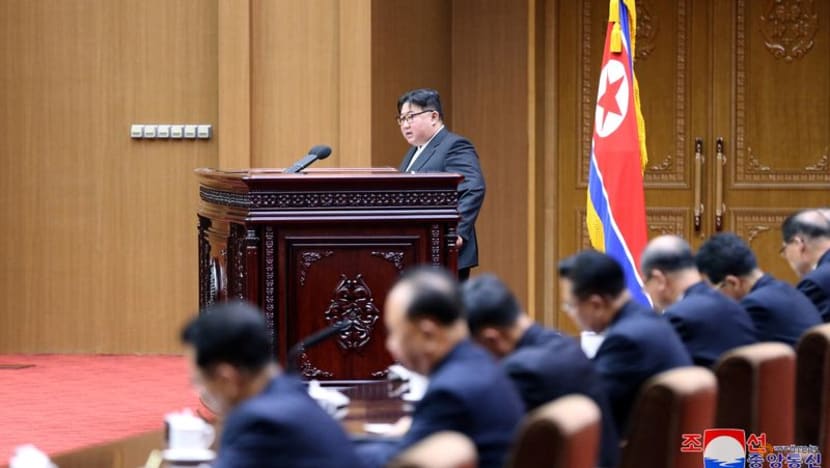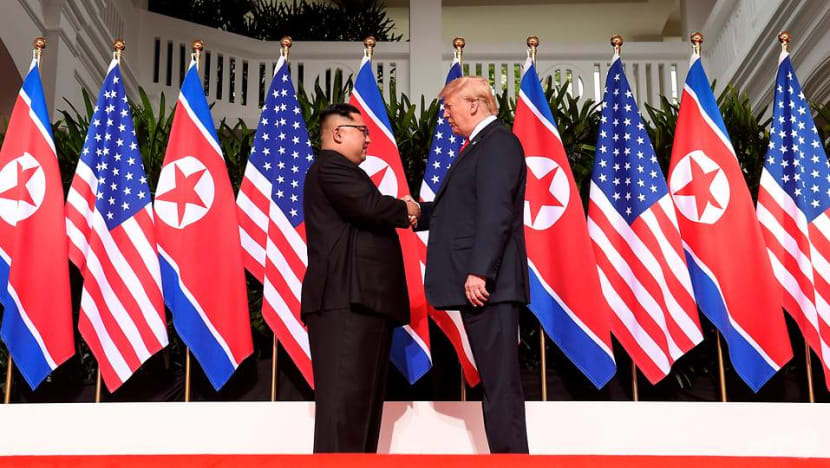Kim Jong Un’s move to label South Korea an enemy, drop reunification policy part of North’s diplomatic playbook: Experts
Manufacturing crisis is a key aspect of North Korea's foreign policy, and leader Kim Jong Un is expected to continue escalating tensions in the coming months, said observers.


This audio is generated by an AI tool.
North Korean leader Kim Jong Un’s move to label South Korea an enemy and do away with the aim of reunification between both Koreas, is part of a foreign policy approach of intentionally manufacturing crisis, observers said.
Despite raising regional tensions and risking the eruption of an actual conflict, the move appears to be out of the country’s diplomatic playbook, as there have been past instances of such antagonistic behaviour, they said.
North Korea is expected to continue escalating tensions in the coming months, as Russia’s war with Ukraine rages on, and as South Korea and the United States are tied up domestically with elections, observers said.
Since the 2022 invasion of Ukraine, Russia has deepened ties with North Korea to secure artillery for its war efforts, with the latter possibly receiving in return advanced technology, such as space and nuclear expertise.
In a speech to the Supreme People's Assembly on Monday (Jan 15), Mr Kim called for the country’s constitution to be changed to ensure that South Korea is seen as the "primary foe".
He said that unification with the South was no longer possible, and called for the severing of all inter-Korean communication and the destruction of a monument to reunification in Pyongyang.
Three organisations dealing with unification and inter-Korean tourism would also be shut down.
A HISTORY OF ANTAGONISM
“Manufacturing crisis is a key aspect of North Korea's foreign policy,” Mr Gordon Kang, senior analyst at the S. Rajaratnam School of International Studies (RSIS), told CNA’s Asia Now on Tuesday.
He noted that for Pyongyang, antagonism has historically been a key part of its discourse in dealings with the United States, Japan and South Korea.
North Korean leader Kim’s latest move aims to solidify South Korea as foreign antagonists, to be dealt with at a distance without the complexities of reunification involved, he said.
“I think it does lead to a level of insecurity and military movements between both Koreas at the Northern Limit Line,” said Mr Kang.
He noted that South Korea has reacted strongly to the North’s artillery drills and ballistic missile tests, and that rhetoric between the two sides have also increasingly sharpened over the past year.
“What this entails is that there's a higher likelihood (of) an inadvertent moment where both sides trigger the other into hot conflict,” he said.
Mr Sung-yoon Lee, a fellow at the Woodrow Wilson International Center for Scholars, told CNA938 on Wednesday that Mr Kim’s actions are premised on an element of psychological manipulation.
“Contrary to the pervasive view out there that the North Korean dictator is crazy or that he lashes out endlessly, the North Korean regime is quite methodical and quite good in playing both the game of graduated escalation by issuing threats … and also propaganda,” he said.
He explained that Mr Kim has taken this step as previous declarations of inter-Korean solidarity and rapprochement had yielded nothing for the North’s nuclearisation ambitions.
Mr Lee noted that Mr Kim is following in the footsteps of his father Kim Jong Il.
After inheriting power in 1994, the elder Kim carried out small-scale but lethal attacks against South Korea for six years, before an about-turn towards diplomacy.
He visited Beijing in May 2000, and then welcomed then-South Korean president Kim Dae-jung to Pyongyang for the first ever inter-Korean summit the following month.

In October that year, the elder Kim also sent a special envoy to visit then-US president Bill Clinton in the White House, and also received then-US secretary of state Madeleine Albright in Pyongyang.
Through such overtures, the world saw “the arrival of a reform-minded (and) reasonable leader”, said Mr Lee.
The younger Kim had re-enacted such diplomatic moves in 2018, sending his sister Kim Yo Jong on a visit to South Korea, and holding a series of summits with his Chinese, South Korean and American counterparts.
“With elections in South Korea in April and in the US in November, I expect North Korea to continue to try to enhance its net value, which is not through diplomacy, conventionally speaking, but causing problems (and) exploiting insecurity,” said Mr Lee.
SOUTH KOREAN RESPONSE
In response to Kim’s announcement, South Korea’s President Yoon Suk Yeol had vowed to punish North Korea "multiple times stronger" in the event of any act of provocation against his country.
While such a response is expected, Mr Kang said both Koreas should be careful and understand where the limits of provocation lie, so as not to inadvertently escalate tensions in the Korean peninsula into an actual conflict.
Mr Lee said that South Korea is expected to strengthen its “trilateral quasi alliance structure” with the US and Japan amid rising tensions in the region.
Despite historical issues between South Korea and Japan, some of which remain sensitive and unresolved, President Yoon has made an effort to mend relations with Tokyo at the cost of his own approval ratings, said Mr Lee.
“We will see more trilateral military defensive operations which will provoke North Korea,” he noted.
“North Korea is very good at coming up with pretexts for doing things that it probably was planning to do anyway, like firing an intercontinental ballistic missile (ICBM) or perhaps conducting a nuclear test for the first time in some years now.”
GROWING CLOSER TO RUSSIA
Russia’s invasion of Ukraine, which has dragged on for almost two years now, has created an opportunity for President Vladimir Putin and North Korea’s Kim to increase military collaboration and cooperation to achieve the long-term goals of both nations, while raising uncertainty and insecurity in Washington, said Mr Lee.
North Korea has also been relatively isolated from the outside world since the COVID-19 pandemic started, noted Mr Kang.
“In the short term, I expect both sides to pledge further support for each other. North Korea needs Russia for high-tech military technology (while) Russia needs North Korea for arms, artillery and missiles,” said Mr Lee.
He said countries like the US, South Korea, Japan and European nations, are concerned over the two sides’ potential collaborations on sensitive military technology like ICBMs and nuclear-powered submarines.
He also noted that over the years, Russia and China have worked together to block attempts within the United Nations (UN) Security Council to call for a new resolution increasing sanctions against North Korea.
“It's a brave new world for the dictators of the world,” said Mr Lee.
North Korean Foreign Minister Choe Son Hui arrived in Moscow on Sunday for talks with her Russian counterpart Sergei Lavrov, as their countries seek to deepen economic, political and military ties – a meeting which Mr Lee said is “more than just a show of having a representative visit”.
China, meanwhile, is probably not willing to be as brazen as Mr Putin and Mr Kim in terms of military cooperation, said Mr Lee, but will not want to be left behind in fostering relations.
“North Korea has always been Beijing's ace card vis-a-vis the long-term strategic competitor that is the United States,” he explained.
He said that while China pursuing a closer bilateral relationship with North Korea would displease Russia, “North Korea has everything to gain by playing off the bigger powers against each other”.














